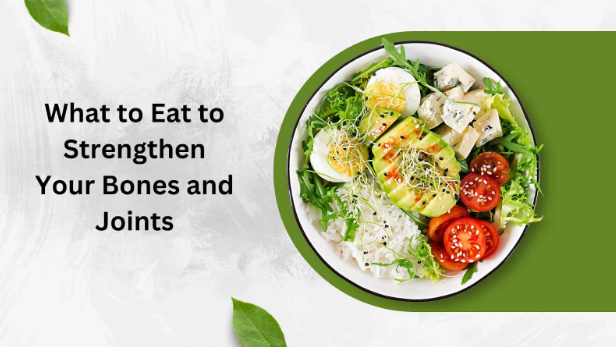Maintaining strong bones and flexible joints is essential for overall health and mobility. As we age, the risk of osteoporosis, arthritis, and other joint-related issues increases. However, incorporating the right foods into your diet can help support bone density, reduce inflammation, and keep your joints healthy. In this guide, we’ll explore the best foods to include in your diet to strengthen your bones and joints.
The Building Blocks of Bone and Joint Health
Bones and joints rely on a variety of nutrients to stay strong and functional. These include:
- Calcium: The primary mineral that strengthens bones.
- Vitamin D: Essential for calcium absorption.
- Omega-3 Fatty Acids: Helps reduce joint inflammation.
- Vitamin K: Supports bone density and repair.
- Magnesium: Aids in bone structure and calcium metabolism.
- Collagen: A protein that supports cartilage and joint health.
Best Foods for Bone and Joint Health
1. Dairy Products
Dairy products such as milk, cheese, and yogurt are rich in calcium and often fortified with vitamin D. Opt for low-fat or non-fat options to keep saturated fat intake in check.
2. Leafy Green Vegetables
Vegetables like kale, spinach, and broccoli are excellent sources of calcium and vitamin K. They’re also packed with antioxidants, which may help reduce inflammation in joints.
3. Fatty Fish
Salmon, mackerel, and sardines are loaded with omega-3 fatty acids and vitamin D. These nutrients play a key role in reducing joint inflammation and improving bone density.
4. Nuts and Seeds
Almonds, walnuts, chia seeds, and flaxseeds provide a healthy dose of magnesium and omega-3s. These nutrients support joint flexibility and bone strength.
5. Legumes
Beans, lentils, and chickpeas are rich in magnesium and protein, which are essential for bone health and maintaining muscle strength around joints.
6. Whole Grains
Whole grains like quinoa, brown rice, and oatmeal contain magnesium and help reduce inflammation markers in the body, supporting overall joint health.
7. Fruits Rich in Vitamin C
Citrus fruits, strawberries, and bell peppers are high in vitamin C, which aids collagen production. Collagen is a key component of cartilage, providing cushioning in your joints.
8. Bone Broth
Bone broth is a natural source of collagen and gelatin, which support joint health and may reduce symptoms of arthritis.
9. Eggs
Eggs are a good source of vitamin D and protein. They’re easy to incorporate into meals and contribute to overall bone and joint maintenance.
10. Soy Products
Tofu, edamame, and soy milk contain plant-based calcium and protein, making them excellent options for strengthening bones and joints, especially for those following a vegetarian or vegan diet.
Additional Tips for Bone and Joint Health
Stay Hydrated
Proper hydration supports joint lubrication and helps prevent stiffness. Aim to drink at least 8 cups (2 liters) of water daily.
Limit Inflammatory Foods
Reduce your intake of processed foods, sugary snacks, and excessive alcohol, as they can increase inflammation and negatively impact joint health.
Combine Diet with Exercise
Weight-bearing exercises like walking, running, or resistance training can enhance bone density, while low-impact activities like yoga and swimming improve joint flexibility and reduce stiffness.
Focus on Vitamin D Exposure
In addition to consuming vitamin D-rich foods, ensure you get some sunlight exposure daily to support your body’s natural production of vitamin D. Even a short 10-15 minutes outside can make a difference.
Incorporate Anti-Inflammatory Spices
Spices such as turmeric and ginger contain anti-inflammatory properties that can help reduce joint pain and stiffness. Add these to your meals or enjoy them as teas.
Balance Your Protein Intake
While protein is essential for muscle and bone health, too much protein, especially from animal sources, can increase calcium loss. Strive for a balanced intake, including plant-based proteins.
Avoid Smoking and Excessive Alcohol
Smoking and heavy alcohol consumption can weaken bones and negatively affect joint health. Reducing or eliminating these habits can significantly benefit your overall skeletal health.
Conclusion
Strengthening your bones and joints requires a combination of the right nutrients, regular exercise, and healthy lifestyle choices. By incorporating calcium-rich dairy, leafy greens, omega-3-packed fish, and other nutritious foods into your meals, you can build a solid foundation for long-term bone and joint health. Enhancing your diet with anti-inflammatory spices, staying active, and maintaining balanced protein levels further support your goals. Start making these dietary and lifestyle changes today, and enjoy a more active, pain-free life in the years to come.




